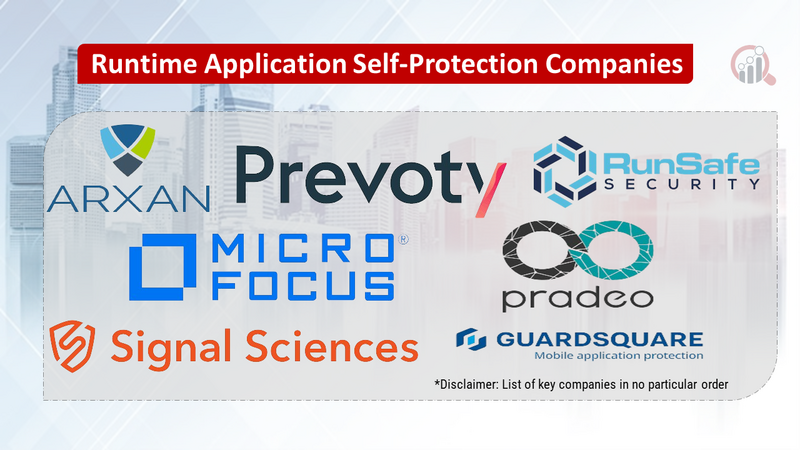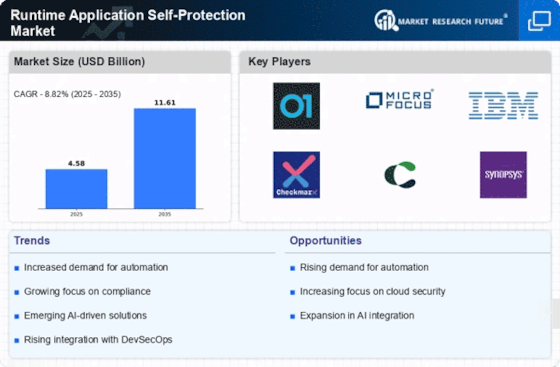Top Industry Leaders in the Runtime Application Self Protection Market

Runtime Application Self-Protection Market: Dive into the Latest News and Updates
In today's interconnected world, cyber threats lurk around every digital corner. While perimeter defenses are crucial, vulnerabilities within applications themselves leave a gaping security hole. Here's where Runtime Application Self-Protection (RASP) comes to the rescue. This rapidly expanding market empowers applications to defend against attacks in real-time, acting as an internal bodyguard for your software.
Some of Runtime Application Self-Protection Companies Listed Below:
- Arxan
- Signal Sciences
- Immunio
- Micro Focus
- Promon, Runsafe Security
- Vasco Contrast Security
- Guardsquare
- Pradeo
- Prevoty
Strategies Driving Market Growth:
-
Focus on Proactive Defense and Runtime Detection: RASP solutions that go beyond static analysis and offer real-time behavior monitoring and anomaly detection attract businesses seeking cutting-edge security. -
Integration with Existing Security Frameworks: Seamless integration with security information and event management (SIEM) platforms and other security tools facilitates centralized monitoring and incident response. -
Cloud-Based Delivery and Scalability: Cloud-based RASP solutions cater to the increasing cloud adoption trend and offer easy deployment, automatic updates, and flexible scalability for businesses of all sizes. -
Compliance and Data Privacy Emphasis: Demonstrating compliance with data privacy regulations and offering robust security features builds trust and opens doors to regulated industries.
Market Share Decoding: Key factors to Consider:
-
Feature Set and Functionality: Companies offering diverse RASP functionalities like code integrity monitoring, threat behavior analysis, and automated defense mechanisms attract broader customer bases. -
Accuracy and False Positive Rates: RASP solutions with high detection accuracy and minimal false positives ensure effective protection without disrupting application performance. -
Ease of Integration and Deployment: Solutions offering seamless integration with existing security tools and straightforward deployment processes cater to diverse IT environments. -
Cost-Effectiveness and Pricing Models: Affordable pricing options and flexible subscription models make RASP solutions accessible to businesses of all budgets.
New and Emerging Stars: Illuminating the RASP Path:
-
AI and Machine Learning Integration: Startups like Deepwatch and Crowdstrike Falcon X are integrating AI and ML for advanced threat detection and predictive analysis, enhancing RASP effectiveness. -
Containerized and Cloud-Native Focus: Companies like Sysdig and StackRox are specializing in RASP solutions specifically designed for containerized and cloud-native environments, catering to the increasing adoption of these architectures. -
API Security and Microservices Protection: Startups like Apigee and Nonstop Security are focusing on RASP solutions for APIs and microservices, addressing the growing security needs of modern application architectures.
Investment Trends: Where the RASP Dollars Flow:
-
AI and Machine Learning-powered RASP: Investors are backing companies developing RASP solutions featuring advanced AI and ML capabilities for more accurate threat detection and proactive defense. -
Cloud-Based RASP Delivery: Investments are pouring into companies offering cloud-based RASP solutions, aiming to capitalize on the cloud adoption trend and provide scalable security for cloud-hosted applications. -
Integrated Security Platforms with RASP Functionality: Companies developing security platforms that seamlessly integrate RASP functionalities are receiving significant investment due to their potential for comprehensive application protection.
Latest Company Updates:
February 7, 2024:
-
Increased adoption of AI and machine learning (ML) in RASP solutions: Advanced anomaly detection, threat prediction, and real-time behavioral analysis for proactive protection. -
Focus on zero-trust security principles within RASP: Least-privilege access controls and microsegmentation limit attacker capabilities even within compromised applications.
February 14, 2024:
-
Integration of RASP with containerized and serverless workloads: Providing comprehensive security for modern cloud-native applications. -
Focus on portability and platform independence: RASP solutions adapt to diverse application environments and cloud platforms.
February 21, 2024:
-
Rise of "self-healing" RASP capabilities: Automated remediation of vulnerabilities and suspicious behavior to minimize attack impact. -
Focus on continuous improvement and threat intelligence sharing: Real-time adaptation to new threats and vulnerabilities through collaborative network of RASP vendors and security researchers.
February 28, 2024:
-
Growing awareness of insider threats and supply chain vulnerabilities: RASP technologies extend protection beyond external attackers to address internal risks. -
Focus on code integrity monitoring and tamper-proofing: RASP ensures application code remains unaltered and functions as intended.











